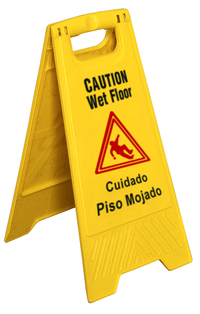liability for bare feet
 Venues can comfortably allow barefoot patrons and protect themselves from legal issues by making a reasonable effort to keep floors clean and safe enough for anyone not wearing close-toed, thick-soled safety shoes, and by giving simple notification of any hazards that may exist.
Venues can comfortably allow barefoot patrons and protect themselves from legal issues by making a reasonable effort to keep floors clean and safe enough for anyone not wearing close-toed, thick-soled safety shoes, and by giving simple notification of any hazards that may exist.
One common misconception about people going barefoot in public is that stores, restaurants, libraries and other venues will be liable if the unshod patron is hurt. We've looked extensively into this legal issue and can say that venues have nothing to fear from allowing patrons without shoes.
Without getting too technical legally, establishments have a "duty of care" to patrons whom they invite in. These venues should make a reasonable effort to get rid of dangers that might cause harm and must warn patrons of any potential dangers. A perfect real-world example of this is with wet floors. When a liquid spill happens, staff should make a reasonable effort to clean it up, and they must warn that a hazard exists. They usually do this with "Wet Floor" signs.
Establishments are not legally responsible for the actions of their patrons. When someone walks into a public venue, they legally assume whatever risk they bring upon themselves.
If a grocery store customer chooses to walk on a recently-mopped surface that is displaying a "Wet Floor" sign, the law sees them as taking on the liability for that risk. If a patron chooses to go barefoot into a venue where shoes are customarily worn, they are making the decision to assume the legal risk of injury if footwear would have otherwise protected their feet.
Venue managers who are concerned about their liability for a barefoot patron should make a resonable effort to keep the floors clean and safe enough for anyone not wearing close-toed, thick-soled safety shoes. This fulfills the establishment's legal duty of care. If hazards beyond the norm for that type of venue might exist, management can verbally warn patrons, or post a sign saying, for example, "Caution, broken glass and other hazardous materials may be present on the floor." A sign like this would inform everybody of the danger, including bare-handed patrons who might need to pick up something they've dropped, or anyone bringing small children into the venue.
related: facts about safety when barefoot




